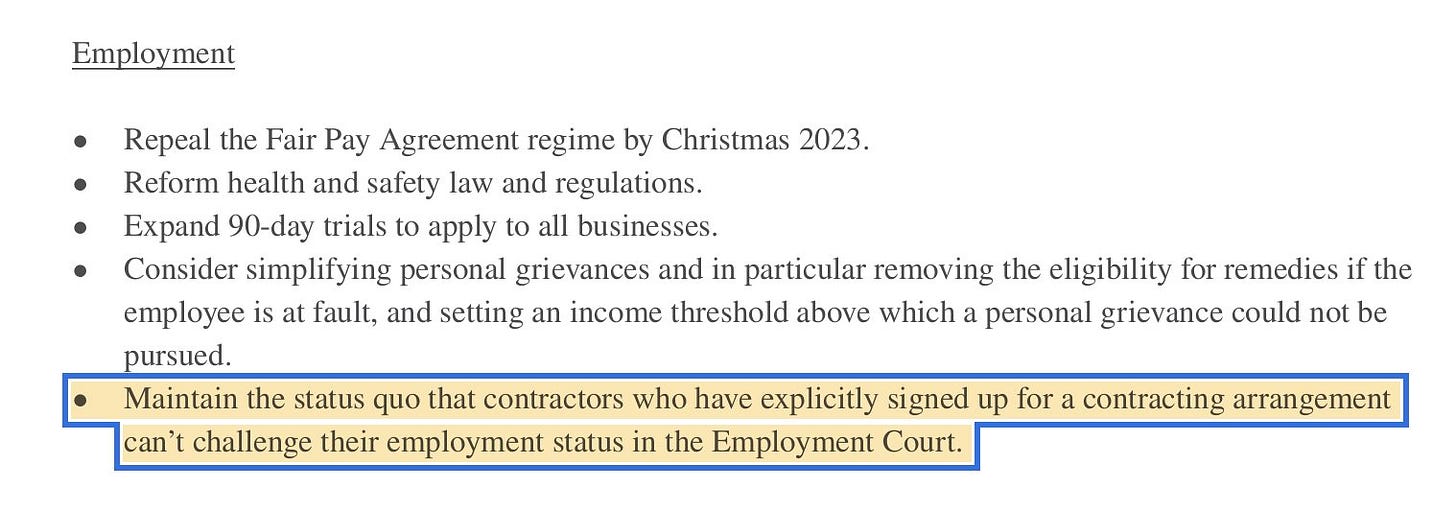Did the "status quo" begin in 2021?
Amendments proposed to the Employment Relations Act this week have friends in high places.
It’s hard to keep up with everything that’s going on at the moment. It’s all important. Thanks for everyone who has kept up with the things I haven’t been able to; you’re all legends.
On Tuesday the government introduced the Employment Relations Amendment Bill to Parliament.
It proposes four main changes: removing the right to lodge a personal grievance for workers who earn more than $180,000 a year, reducing personal grievance payouts, rolling back the 30-day rule, and, perhaps most importantly, and implementing a new “contractor gateway” test.
That would amend Section 6 of the Employment Relations Act which defines what an employee is, to exclude a “specified contractor”, which would be somebody
with a written agreement that says they’re a contractor,
who’s not restricted from working for somebody else,
who’s not required to perform work at a given time or can subcontract their work to somebody else,
the arrangement doesn’t terminate if the worker declines, and
that person had a reasonable opportunity to seek independent advice before entering the arrangement.
Workplace Relations and Safety Minister Brooke van Velden told the Platform that
“Some businesses are confused whether or not they’ve got an employee or a contractor and some workers are confused if they’re an employee or a contractor too. Those come with different obligations … it’s actually quite important they know what they’re signing up to.”
The Minister refers to how work in the modern economy is changing, describing how workers might do short-term gigs, for example if they’re “a delivery driver, or signing up for an app for short-term work”. You don’t have to plough through the Ministerial Diaries to see who’s been in the Minister’s ear (on May Day no less)…
In October last year RNZ reported on a proposal taken by Uber to a meeting with Minister Brooke van Velden in May to amend the Employment Relations Act. Does it look familiar?
Readers may know some of the broader context here. In October 2022 the Employment Court recognised that a group of four Uber drivers were employees of the company, not independent contractors. In June 2023 Uber was granted leave to appeal that decision, and a few weeks later the Act Party announced a policy that “contractors who have explicitly signed up for a contracting arrangement cannot challenge their employment status in the Employment Court”.
This issue was so important that it made the coalition agreement:
In August 2024 the Court of Appeal dismissed Uber’s appeal, with the Court of Appeal finding that those drivers were in fact employees, with justice Goddard, Ellis and Wylie noting that they
“do not consider that drivers can, in reality, be said to be carrying on transport service businesses on their own account at times when they are logged into the driver app, providing services to riders referred to them by Uber for the remuneration determined by Uber, and subject to the high level of control and direction that Uber exercises over the provision of services by drivers while logged in.”
Uber have since appealed to the Supreme Court, and the hearing will take place next month. The timing of these proposed changes is certainly fortuitous.
The Court of Appeal decision is a fascinating read, and include some sections from Uber’s driver agreement. I thought Clause 28.1 made for some pretty interesting reading:
Just to quote that again:
“This Agreement … does not create an employment, independent contractor or worker relationship…”
I was pretty stunned to read this, so checked to see if this was still the case.
This 2021 Uber Eats driver agreement shows the company now defines the relationship between the parties as one of a self-employed contractor:
The “status quo” that the Act Party wants us to return to is not some immutable reality baked into the norms of our society. It wasn’t long ago that Uber denied having any kind of working relationship with its drivers whatsoever, and all of this could change in the future if the company decides otherwise.
Minister van Velden loves to use the analogy about how we’re “more obsessed with how to slice the pie than focusing on how to grow it.” I love pies and I’d love to get a team of bakers and biologists into a room together to discuss how one might grow a pie, but I digress.
Amending our labour laws on the whims of cashed up multinationals isn’t some magic recipe for economic growth. It’s textbook “slice the pie” stuff, and nobody’s under any pretension about who’s going to end up with the bigger slice as a result of these changes.





